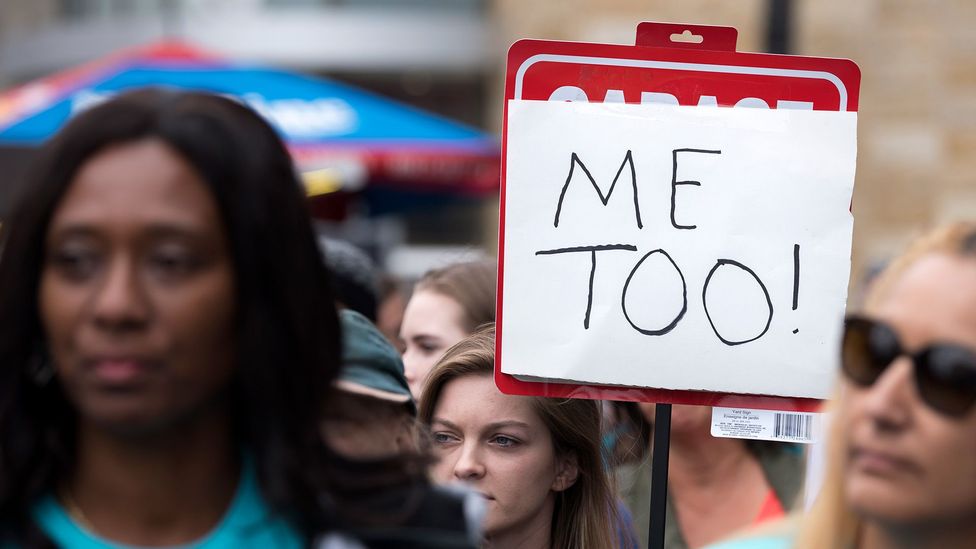Why Is Someone Who Is Sexually Assaulted Likely to Be Assaulted Again
Why sexual assault survivors forget details

And four other misconceptions nigh sexual violence.

The majority of sexual assaults are committed past someone known to the victim (Credit: Getty)
But in the Britain, for instance, a split up written report plant that the perpetrator was a stranger in only ten% of rape and serious sexual assaults, while in 56% of cases information technology was the victim'due south partner, and for the remaining 33% it was a friend, acquaintance, or other family unit member.
2. A 'real' sexual assail survivor always reports immediately
According to United kingdom of great britain and northern ireland Home Role data, 46% of recorded rapes were reported on the day they took place – while 14% of people took more than six months to report that they'd been assaulted. If the victim was a kid, they were even more likely to delay coming forward: but 28% of those anile under 16 reported the offence on the day it happened, while a third waited for longer than half-dozen months.
That is merely for assaults that ultimately are reported. Many others are non. In the U.s.a., for example, studies have estimated that two out of three sexual assaults never are reported.

Studies have estimated that 2 out of iii sexual assaults become unreported (Credit: Getty)
There are many reasons why some people either delay reporting or never do, as testified to by the "#WhyIDidn'tReport" hashtag on Twitter. "A lot of people don't report because they don't want the perpetrator to become to prison: maybe they're in love with them, or it'due south a family member, or it'southward a partner and are reliant on their income," says Nicole Westmarland, director of Durham Eye for Research into Violence and Corruption in the Uk. "Some other mutual reason I hear from students is that they don't want to ruin the remainder of the person's life."
Even then, "at that place is no show that suggests the timing of when y'all study is linked to the genuineness of the report", she says.
iii. If assaults were reported immediately, it would exist relatively easy to investigate and press charges
Information technology is true that survivors of rapes and sexual assaults who come forward quickly are more probable to undergo a forensic medical test, which involves taking swabs and samples from the body to place the source of any semen, saliva, or Dna. Examiners likewise document injuries such as cuts, grazes or bruising, which could support allegations of force.
But undergoing a physical test doesn't necessarily mean an offender will exist caught and convicted, or even that the example volition be investigated – every bit demonstrated by the hundreds of thousands of rape kits that sit untested in police departments and forensic storage facilities across the US. And physical evidence tends to be less helpful if the person you're accusing is a partner or close acquaintance. "Most cases these days don't come down to whether sexual intercourse happened – or forensic evidence of intercourse. They come downwardly to whether that intercourse was consensual or not," says Westmoreland.
Co-ordinate to UK Home Office data, 26% of rapes and serious sexual assaults reported on the same day resulted in someone being charged, dropping to 14% one time a twenty-four hour period or more has elapsed. Those who reported the offence on the day it took place also had significantly higher odds of seeing their case become to court – although it made less of a departure if the victim was nether the age of 16. In the United states of america, meanwhile, separate reports have institute that merely eighteen% of reported rapes atomic number 82 to an arrest and 2% result in a conviction.
four. If you didn't 'really' want information technology, you'd fight back
People vary in their response to rape and sexual assault. In her 2008 book, Serial Survivors, the Academy of Wellington criminologist January Hashemite kingdom of jordan describes the very unlike techniques employed by 15 women who were sexually assaulted by the same man: some tried talking to him; others fought back; notwithstanding others tried to mentally remove themselves from the situation – a process psychologists refer to as 'dissociation'.
Some other study, which examined 274 police reports from the Us, found that but 22% of survivors resisted rape through fighting and screaming. The majority (56%) tried begging and pleading with their offender, while others reported feeling 'frozen with fright'. Different scenarios were more than or less effective in different circumstances. Women who fought back, for example, were more probable to avoid rape – but they as well ran a higher adventure of greater physical injury if a weapon was present. On the other hand, pleading, crying or reasoning with the perpetrator was associated with increased concrete injury if the attack took place indoors and increased sexual abuse if environmental intervention (such as someone intruding) occurred.

One report constitute that fighting back or pleading during an assault can, in sure circumstances, heighten the risk of physical injury or worsen the sexual abuse (Credit: Getty)
It is besides important to recognise that people can't necessarily control their responses in such situations. Some enter a state of involuntary physical paralysis known as 'tonic inhibition' when confronted with an extreme threat. A Swedish study of 298 women who visited an emergency rape clinic within a month of having been sexually assaulted found that 70% reported significant tonic immobility and 48% reported extreme tonic immobility during the assail – and that those who experienced it were as well more likely to develop postal service-traumatic stress disorder and severe low in the coming months.
5. Traumatic experiences scramble your memories: perhaps you've misremembered what happened
Many people who accept been raped or sexually assaulted ofttimes merits to accept vivid memories of certain images, sounds and smells associated with the attack – even if happened decades earlier. Yet when asked to recall exactly what time of day it was, or who and what was where at any given time – the kinds of details police and prosecutors often focus on to institute the facts of a crime – they may struggle or contradict themselves, undermining their testimony.
"There is this tragic discrepancy betwixt what is expected inside the criminal justice organisation and the nature of trauma memories and how people are likely to be reporting them," says Amy Hardy, a clinical psychologist at Kings College London.
This is because memories of traumatic events are laid downwardly differently to everyday memories. Usually we encode what nosotros run into, hear, smell, taste and physically sense, as well as how that all slots together and what it means to us – and together, those dissimilar types of information together enable united states of america to recall events every bit a coherent story. But during traumatic events our bodies are flooded with stress hormones. These encourage the brain to focus on the here and now, at the expense of the bigger picture.

During traumatic events our bodies are flooded with stress hormones, encouraging the brain to focus on details (Credit: Getty)
This makes sense from an evolutionary perspective. "When we are under threat, information technology is much ameliorate that we focus on what nosotros are experiencing, which triggers u.s. into fight, flight or freeze-type responses, than to focus on the bigger meaning and making sense of information technology," says Hardy. "Nosotros also know that if people dissociate during trauma – where the cognitive role of the encephalon shuts down and they go a bit spacey or numb – information technology exaggerates this fragmentation process, and so their memories have an even more here-and-at present-type quality."
Hardy has examined the impact of these memory processes on survivors' experience of reporting sexual assault to the police. She found that those who reported higher levels of dissociation during the assail perceived their memories to be more than fragmented when interviewed past police force and that those with greater levels of memory fragmentation were more probable to feel that they had given an incoherent account of what happened. And these factors, in turn, left them less likely to proceed with the legal case.
Bring together 900,000+ Future fans by liking u.s. on Facebook , or follow us on Twitter or Instagram .
If y'all liked this story, sign upwardly for the weekly bbc.com features newsletter , called "If Y'all But Read 6 Things This Week". A handpicked selection of stories from BBC Future, Civilization, Capital, and Travel, delivered to your inbox every Friday.
Source: https://www.bbc.com/future/article/20180926-myths-about-sexual-assault-and-rape-debunked
0 Response to "Why Is Someone Who Is Sexually Assaulted Likely to Be Assaulted Again"
Post a Comment